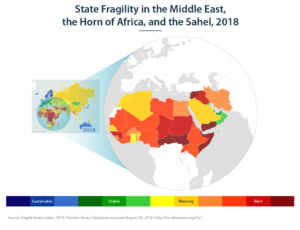
Credit: USIP
The United States needs a new national security strategy to prevent the spread of extremism in fragile states, say Rep. Lee Hamilton and Gov. Thomas Kean, co-chairs of the 9/11 Commission. They led a bipartisan group of national security experts which today released the first report of the Task Force on Extremism in Fragile States, convened by the United States Institute of Peace.
“Beyond the Homeland: Protecting America from Extremism in Fragile States,” is the first report to be issued by the congressionally mandated, bipartisan Task Force on Extremism in Fragile States, which aims to address the 9/11 Commission’s unfulfilled call for a preventive strategy to reduce the spread of extremism.
 The post-2001 campaign against jihadi groups established financial, political, and military norms that prepared and equipped regimes and even the local populace to contain the rise of jihadi groups in 2011. But it has now outlived its usefulness, argues Hassan Hassan, a co-author of ISIS: Inside the Army of Terror, and a senior fellow at the Tahrir Institute for Middle East Policy in Washington.
The post-2001 campaign against jihadi groups established financial, political, and military norms that prepared and equipped regimes and even the local populace to contain the rise of jihadi groups in 2011. But it has now outlived its usefulness, argues Hassan Hassan, a co-author of ISIS: Inside the Army of Terror, and a senior fellow at the Tahrir Institute for Middle East Policy in Washington.
Jihadis no longer speak to communities from the ivory tower of vanguard ideas, he writes for The Atlantic. They are fighting the local fight, and that has enhanced their relevance and bred success. Combatting the threat they pose will require taking a similarly local approach…—delivering effective governance to local communities.
 Over the course of more than 15 years and three presidential administrations, Americans have consistently said that defending the nation against terrorism should be a top policy priority for the White House and Congress, according to Pew Research Center surveys conducted since shortly after the attacks of Sept. 11, 2001.
Over the course of more than 15 years and three presidential administrations, Americans have consistently said that defending the nation against terrorism should be a top policy priority for the White House and Congress, according to Pew Research Center surveys conducted since shortly after the attacks of Sept. 11, 2001.
There has been a slow but steady ebbing of the fixation on the threat of terrorism over the 17 years since the attacks of September 11, 2001, when jihadist extremism has come to dominate America’s threat landscape like nothing else since Soviet Russia did during the Cold War, argues Ambassador Daniel Benjamin, director of the John Sloan Dickey Center for International Understanding at Dartmouth College and coordinator for counterterrorism at the State Department 2009-2012.
One important benefit of the declining obsession with terrorism is that it has allowed the biggest agency in the government, the Defense Department—which appears to have recognized U.S. over-investment in one threat area—to begin reallocating resources, he writes for POLITICO. Defense Secretary Jim Mattis early in the year unveiled a new National Defense Strategy in which the threat of extremist violence was replaced by “growing threats from revisionist powers as different as China and Russia.”
 Like communist groups in the 20th century, jihadist groups are likely to split further in the 21st century due to differences in personality, theology and vision, argues Scott Stewart, VP of Tactical Analysis at Stratfor. Because military might can only go so far in defeating an ideology, governments such as the United States will use military force to limit the power and reach of the jihadists in an effort to defeat them ideologically, he contends:
Like communist groups in the 20th century, jihadist groups are likely to split further in the 21st century due to differences in personality, theology and vision, argues Scott Stewart, VP of Tactical Analysis at Stratfor. Because military might can only go so far in defeating an ideology, governments such as the United States will use military force to limit the power and reach of the jihadists in an effort to defeat them ideologically, he contends:
The jihadist movement is not a monolith. Indeed, beyond the obvious schism between al Qaeda and the Islamic State, jihadism is a “glocal” phenomenon made up of an array of local actors including the core organizations, regional insurgent groups and grassroots jihadists. Each poses a distinct threat and must be addressed by a combination of global coordination and local action. However, until the ideology of jihadism is defeated, its proponents will be able to recruit new adherents. Accordingly, the ideological battle against jihadism is as important, if not more so, as the physical struggle.
 The USIP report details how extremism is fueling growing instability and security threats to the United States in fragile states, and how America’s rivals are exploiting this disorder to grow their power and influence.
The USIP report details how extremism is fueling growing instability and security threats to the United States in fragile states, and how America’s rivals are exploiting this disorder to grow their power and influence.
“The world order has changed in the 17 years since 9/11,” said Representative Lee Hamilton. “The nature of terrorism has evolved—extremist groups are taking advantage of fragility in the Middle East, Sahel and Horn of Africa to establish new governments built on intolerance, exclusion and hate that spur violence and civil conflict within and across borders. Other global and regional powers—Russia, China, Iran—have fueled this instability, which poses a new threat to U.S. interests at home and abroad. We cannot effectively thwart these competitors without quashing extremism.”
Others raise a compelling question: whether our national leaders today understand why it is important to seek out and destroy terrorist organizations and to use all the tools available, including diplomacy, to defend the desire for democracy in Islamic and other lands as well as press against regimes that would crush democracy.







